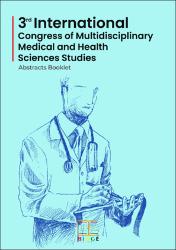The relationship between pain beliefs with pain catastrophizing and kinesiophobia in individuals with shoulder pain: Preliminary results
Citation
Aksan Sadıkoğlu, B.; Analay Akbaba, Y.; Güven, MF. The relationship between pain beliefs with pain catastrophizing and kinesiophobia in individuals with shoulder pain: Preliminary results. 3rd International Congress of Multidisciplinary Medical and Health Sciences Studies (ICOMMEH 2025), s.40.Abstract
The aim of this study was to examine the associations pain beliefs with pain catastrophizing and
kinesiophobia in individuals with shoulder pain. A cross-sectional study was conducted with individuals
experiencing acute or chronic shoulder pain. Participants completed the Pain Beliefs Questionnaire
(PBQ), the Pain Catastrophizing Scale (PCS), and the Tampa Scale for Kinesiophobia (TSK). Pearson
correlation coefficients were calculated to explore the associations between subtypes of pain beliefs and
psychological responses to pain. A total of 46 participants (30 females, 16 males; mean age 48.69 ±
10.72 years) were included. There was a positive correlation between organic pain beliefs and both pain
catastrophizing (r = 0.30, p < 0.05) and kinesiophobia (r = 0.32, p < 0.05). In contrast, psychological
pain beliefs were not significantly correlated with either pain catastrophizing (r = 0.06, p > 0.05) or
kinesiophobia (r = 0.04, p > 0.05). The findings suggest that organic pain beliefs are significantly
associated with both pain catastrophizing and kinesiophobia in individuals with shoulder pain. These
results highlight the potential impact of somatic interpretations of pain on maladaptive psychological
responses. In contrast, psychological pain beliefs showed no significant relationship with either
outcome. Interventions targeting organic pain beliefs may be beneficial in reducing both catastrophizing
and fear of movement in this population.
Source
3rd International Congress of Multidisciplinary Medical and Health Sciences StudiesCollections
- Bildiri Koleksiyonu [12]


















